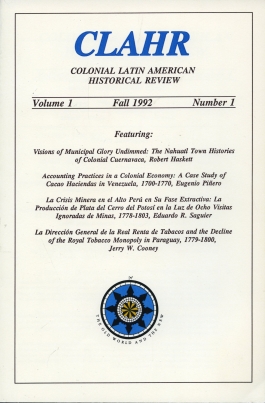Colonial Latin American Historical Review
Volume 15, Issue 3 (Summer 2006)
From the Guest Editor's Desk
Over the past decades, studies on the history of Cuban slavery have appeared with relative frequency. Scholars from within and outside the island have been able to read and discuss each other's work with an increasing regularity, thus allowing debates to flow and new issues to be raised. From the 1960s and 1970s, scholars such as Manuel Moreno Fraginals, José Luciano Franco, Franklin Knight, and Verena Stolcke began calling attention to a wide variety of slavery-related issues such as the economics of sugar production and cultural trends among Africans brought to Cuba. Other scholars such as Gwendolyn Midlo Hall and Herbert Klein chose to focus on Cuban slavery and how it compares to neighboring territories like Saint Domingue and Virginia, adding a new dimension to the understanding of Cuban slavery within the broader historical processes that took place in the Greater Caribbean.
This trend continued during the 1980s. In 1986, the centenary of the abolition of slavery in Cuba constituted perhaps its pinnacle. Several seminars and conferences took place, and an important number of books were published that year. María del Carmen Barcia Zequiera, Eduardo Torres-Cueva, and Rodolfo Sarracino, among many others, provided new interpretations on the Cuban slave system from within the island. Outside, mostly in the United States, some key texts appeared as well, notably those of Robert Paquette on the conspiracy of La Escalera and Rebecca Scott on the post-emancipation period in Cuba.
The 1990s saw a remarkable number of new books and articles published on the topic of slavery in Cuba. Academics from both sides of the Florida Straights also witnessed an unprecedented political opening that allowed them, for the first time, not only to exchange ideas and their work, but also, more importantly, to spend more time together and to create new spaces for academic discussion. Since then, a considerable number of U.S. scholars have had the opportunity to visit the island and conduct research in Cuban archives and libraries. Some Cuban scholars were also given the chance to visit the United States and do the same there. The results were almost immediate. Thanks to these opportunities, many books and articles appeared and continue to be published on the topic. Indeed, all four articles featured in this special issue of the Colonial Latin American Historical Review (CLAHR) are, to a certain extent, a result of these exchanges.
Read more
Articles
From the Guest Editor's Desk
Manuel Barcia
In Memoriam: Larry D. Miller, 1950-2009
Angélica Sánchez-Clark
Cuban Merchants, Slave Trade Knowledge, and the Atlantic World, 1790s-1820s
José Guadalupe Ortega
Plantaciones, matrimonios, y familias de esclavos en la Cuba colonial, 1750-1850
María del Carmen Barcia Zequeira
Exorcising the Storm: Revisiting the Origins of the Repression of La Escalera Conspiracy in Cuba, 1843-1844
Manuel Barcia
Book Reviews
Fernando Santos-Granero, Vital Enemies: Slavery, Predation, and the Amerindian Political Economy of Life
Erick D. Langer
Gonzalo Lamana, Domination without Dominance: Inca-Spanish Encounters in Early Colonial Peru
Kathryn J. McKnight
Full Issue
Full Issue
Spanish Colonial Research Center

